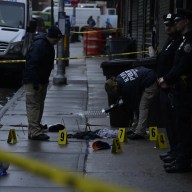By Philip Newman
The Transit Workers Union, the Straphangers Campaign, the Tri-State Transportation Campaign and Common Cause filed suit Monday against the Metropolitan Transportation Authority.Madison Square Garden had previously filed suit against the MTA and the city on the grounds that the deal favored the Jets despite Madison Square Garden's $410 million upfront offer for the 13 acres compared with the Jets' $ 250 million bid.Jordan Barowitz, a spokesman for Mayor Michael Bloomberg, said the lawsuit was “frivolous” and “robs New York of hundreds of millions of dollars in tax revenue for schools, cops and affordable housing.” Bloomberg has said again and again that New York has no chance to get the 2012 Olympics without the West Side stadium. The lawsuit filed jointly by four groups makes no claim that one bid was superior to another but asks that the court declare the existing bids void and that bidding start anew.The lawsuit by the coalition of groups is scheduled to be heard in State Supreme Court May 3.The process the MTA employed in the bidding “clearly violated the MTA's duty to seek the maximum benefit for the public,” the lawsuit said, adding that the MTA itself once estimated the West Side land's value at more than $900 million.”We want top dollar,” said Gene Russianoff, lawyer for the Straphangers Campaign.A series of subway disruptions over the past few weeks brought questions by critics, including City Councilman John Liu (D-Flushing), chairman of the Council Transportation Committee. Liu asked whether the breakdowns were brought on by cuts in state and city money for MTA maintenance. Every few days beginning in mid-March derailments, fires, smoke conditions and other disruptions plagued the subways.New York City Transit Authority President Lawrence Reuter, testifying recently before the Transportation Committee, steadfastly denied it had anything to do with diminished appropriations. In any case, Reuter said, subway service was better than at any time since its inception more than 100 years ago.Reuter pursued that tack throughout two hours of questioning from Liu and other members of the Council Transportation Committee at an April 7 public hearing at City Hall. Reuter cited exhaustive statistics to support his contention, sitting in front an array of large cards bearing graphs and charts.By and large, the Council members were not persuaded that the disruptions, which sent hundreds of thousands of straphangers scrambling for other ways to get where they were going were random occurrences not linked to possible lessened maintenance.On April 15, Reuter issued an official apology for the delays and disruptions.”I want the riders to understand that we take their concerns seriously,” Reuter said. “We are now focusing 100 percent on reducing delays.” MTA Chairman Peter Kalikow then met with Reuter, who afterward sent a memo to his subordinates to intensify maintenance of subway tracks and trains to prevent track fires caused by refuse buildup and to make sure they have enough people to accomplish that mission.One of Reuter's remarks that rankled City Council members was that service now is much better than in the 1970s, when the system neared collapse. Kalikow suggested that 2003 would be a better point of reference since it was perhaps the system's best year as far as service was concerned.Reach contributing writer Philip Newman by e-mail at news@timesledger.com, or by phone at 718-229-0300, Ext. 138.
































